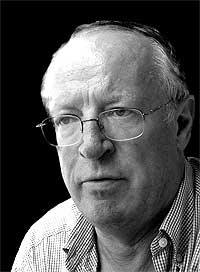
British journalist Robert Fisk has inspired a verb in the blogosphere: to "fisk" is to systematically rebut unwelcome arguments. Bloggers supporting Bush and the Iraq war have long applied the term to their own critiques of Fisk's stories from the Middle East.
In Vancouver to promote his book The Great War for Civilisation: The Conquest of the Middle East, Fisk showed he can fisk his own opponents and critics quite effectively.
Casually dressed, shirtsleeves rolled up, Fisk spoke to a crowd of over 500 on Sunday night at the Maritime Labour Centre at Triumph and Victoria. He struck his theme at once: "Refuse to accept the narrative of history laid down by presidents, prime ministers, generals and journalists."
His own narrative seemed to move almost randomly from the writing of his 1300-page book to the origins of the Palestinian issue to the failings of journalists. But in fact he spoke within a tightly structured blend of history, anecdote and gossip about Osama Bin Laden.
The history ranged from Napoleon promising the Egyptians he had come to liberate them, to prophetic quotes by Palestinian historians. Writing his own history had been depressing, he said: In reviewing centuries of torture, betrayal and genocide, "I am amazed at the restraint of the Muslim world toward us in the West."
Talking with Bin Laden
Fisk told of being on a New York-bound airliner on 9/11, and getting the news via cell phone from his editor in London. After alerting the crew, he described himself and the pilot then walking the length of the plane, looking for suspicious (because Muslim) passengers.
"In ten seconds, Osama Bin Laden had turned me into a racist," Fisk said. "He succeeded in his intent to divide innocent from innocent."
He reminisced about an interview he'd once had with Bin Laden on a mountain in Afghanistan: "From this mountain," Bin Laden had told him, "we helped destroy the U.S.S.R.; we pray to God that he lets us turn the U.S.A. into a shadow of itself." Later he defined Bin Laden as an "ideologist" who actually talks like George W. Bush in terms of good and evil.
"Tens of thousands in Saudi Arabia admire Bin Laden," Fisk said, "because he gains credibility by saying what their rulers won't say."
The forbidden subject of 9/11, Fisk argued, was the why of the attack. To ask why was to be labelled a terrorist and an anti-Semite. "We took the narrative from our leaders," he said. "Raise issues like Palestine and we were told to shut up."
He saw the same narrative emerging in last week's case of the 17 arrested in Ontario on charges of terrorism. That narrative would not involve speculating on whether the 17 might be angry about something happening in the Middle East.
Estimating the real casualties
Journalists took more fisking from Fisk than the politicians did. He read an Iraq story from the Los Angeles Times in which every source was a "U.S. official." He flayed the readiness of reporters to accept the semantic shift that changed the West Bank from "occupied territory" to "disputed territory," from "wall" to "fence." And he blasted the readiness of U.S., British, and Canadian media to give every casualty a name and family -- but not to do so for the Iraqis dying in their anonymous thousands.
Fisk described seeing the real mortality statistics on a computer in the Baghdad morgue last year on a day when 26 new bodies had come in by mid-day. For June 2005, Baghdad alone had recorded 1,100 violent deaths. Project those figures across the country, he estimated, and 36,000 Iraqis a year were dying violently.
Questioners included 9/11 conspiracy theorists; Fisk had clearly heard them before, and responded to them civilly but briefly. Asked about the Iran crisis, he called it "totally false." The real crisis, he said, was Pakistan: a nuclear power that still supported the Taliban and Al-Qaeda, but which couldn't be threatened because it was a supposed ally and already had the bomb.
He also described a meeting in Amman, Jordan, with three leaders of the insurgency, including one of Saddam's generals -- who remembered being interviewed by Fisk on a tank while invading Iran in 1980. The general had recently led the insurgents in the second battle of Fallujah.
Advice for activists
Fisk predicted that eventually the U.S. would have to talk with the insurgents, just as it eventually had to talk with the Vietnamese communists and as Britain had to talk with the IRA.
A listener asked what options for change he could suggest. Fisk laughed, saying he would cease to be a journalist if he became an activist. But he suggested that activists deal with train crews and truck drivers, the people whose sons and daughters will have to fight. "Talk to them. Don't talk to each other."
Crawford Kilian is a frequent contributor to The Tyee. ![]()















Tyee Commenting Guidelines
Comments that violate guidelines risk being deleted, and violations may result in a temporary or permanent user ban. Maintain the spirit of good conversation to stay in the discussion.
*Please note The Tyee is not a forum for spreading misinformation about COVID-19, denying its existence or minimizing its risk to public health.
Do:
Do not: